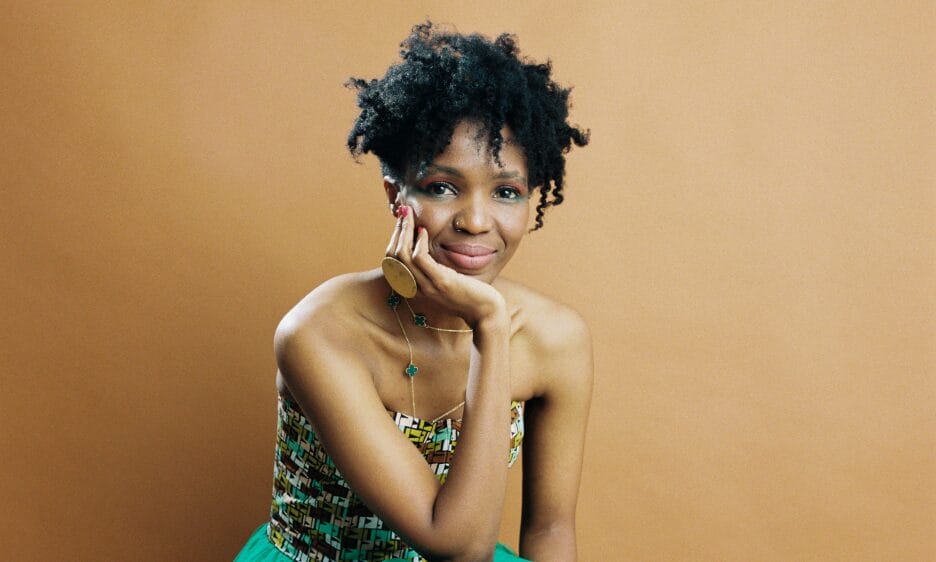Global Beat: Thandi Ntuli

photo: Andile Buka
***
For South African pianist, singer and composer Thandi Ntuli, creating Rainbow Revisited was an experimental journey through time and space. It’s obvious from the album’s first notes—clattering keys leaping in different directions for nearly three minutes before Ntuli begins singing.
She recorded Rainbow Revisited in one expansive, all-day, solo session with Los Angeles producer and musician Carlos Niño in 2019, sitting alone at the piano and exploring motifs, remembering her grandfather’s songs and deconstructing her own. She then shelved it for nearly four years and moved on, while Niño, in fits and starts, listened to her somersaulting improvisations, cutting and pasting the session into a gorgeous, curious 10-track album set somewhere between Soweto and another solar system.
For Ntuli, whose previous albums were freewheeling but fully orchestrated cosmic jazz sets and who has recorded with Shabaka Hutchings, Rainbow Revisited may be the purest distillation of her own musical voice—one that she inherited from generations past, one that was brewing before she was born.
Ntuli’s family is from Sophiatown, a literary and musical hub for Black South Africans near Johannesberg that hit its peak in the 1940s. It was demolished during apartheid in an effort to stamp out Black culture, and Ntuli’s family fled. But a seed was planted.
“Our old family pictures show everyone in bowties, singing together,” she says now, decades later. “That culture carried onto Soweto, where I grew up. The basis of our community was music-making. There’s music in our blood.”
Ntuli began playing the piano at a young age and, by high school, she was hooked—walking “a lonely journey” from her boarding school dorms to the practice rooms, where she would get blissfully lost in the classical compositions she was meant to rehearse.
“I’d find specific sections that I was really drawn to, a particular chord progression on a melody, and I’d play around with them for hours,” she says. “I would imagine where the composer wrote from and see if I could sense that place from the music. I wasn’t just flogging away and learning the notes. I was creating images in my mind. And I wanted to know, ‘How do these compositions come together? How crazy must you be to write something so beautiful?’”
As she continued to learn—turning down a Berklee scholarship to study at the University of Cape Town—she came to know just how crazy she needed to be. She focused on feeling over function in her compositions and asked herself, “Do I want it to sound eerie? Rigid? Classical? Ethereal?”
“Sometimes I’ll compose on an instrument I don’t play well, like guitar, to help me think differently,” she says. “Writing like that is so exciting.”
Ntuli began playing in clubs around South Africa, but a friend pushed her to record an album—which, he said, was just a musician’s business card for festival organizers and talent buyers to book more shows. Her debut album, 2014’s The Offering—named like it was a wink at promoters—was a lot more than a business card. It was a sprawling, space-jazz epic, with Ntuli’s voice fluttering atop beautiful, piano-led compositions. Each album that followed flew even higher, becoming more complex, more layered, more orchestrated.
It’s particularly telling, then, that producer and bandleader Niño got in touch with Ntuli after seeing a loose, impromptu video she posted on Instagram of a pre-performance soundcheck. Niño—who is best known for his work as Carlos Niño & Friends, a collective that has included André 3000 and Kamasi Washington—suggested they collaborate. And Ntuli took him up on the offer when she happened to be in Los Angeles for a show.
She was a bit nervous when she arrived, not sure what to expect. But, without preparing any full compositions, the pianist just sat down and started playing— and Niño began recording.
“I said to myself, ‘I know how to be one with the piano.’ And I surrendered to what wants to be played. I played different melodies and motifs and expanded them—it was repetitive, like a mantra,” she says. “That’s how I open up. The more I stay in a groove, the more I can expand. That’s where my improvisation grows from.”
She toyed with her composition “Rainbow,” stripping it down, repeating the melody and singing freely—exploring new space within a song she knew so well. She also played a melody she remembered from childhood— “Nomayoyo (Ingoma ka Mkhulu),” a favorite of her grandfather’s that she’d sung with her family countless times before but had never recorded. Then, she dipped into some slow, meditative playing, letting her fingers fly up and down the keyboard.
At the end of the session, she wasn’t quite sure what she’d created. She packed up and left—her music was in Niño’s hands now. And over the course of the months, then years that followed, he slowly but steadily chipped the recordings down into songs. He tucked two collaborative recordings—“Voice and Tongo Experiment” and “Breath and Synth Experiment”—into Ntuli’s beautiful solo playing, and they called the album Rainbow Revisited.
For Ntuli, the album is comprised of excerpts from a day of pure creation and improvisation. The experience helped her reach back to her grandfather’s passed-down gift of making music simply to cause joy.
“My grandfather’s music connects me to something bigger than me, older than me, greater than me,” she says. “It makes me belong and speak to a greater tradition than my own. It connects me directly to Sophiatown.”




















